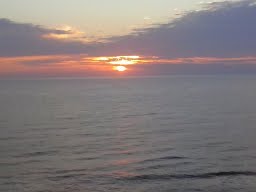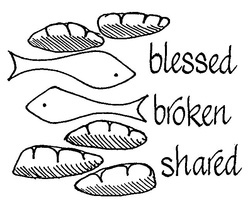 When the brook dried up from which Elijah had been drinking (because of the drought which Elijah had predicted), God led him to a widow in a town on the coast (1 Kings 17:7-16). The widow and her son were also suffering from the drought. When Elijah asked her for food, she told him of her dire circumstances - she was preparing her last meal. Elijah asks her for bread anyway. Then he makes her a promise from God: "The jar of flour will not be used up and the jug of oil will not run dry until the day the Lord gives rain on the land." And so it was. Elijah lived with the woman and her family while God kept his promise. The widow was not an Israelite, but a woman from the area where Jezebel was from. God had sent Elijah to a foreigner, you might say into the enemy's camp, someone who owed an Israeli prophet nothing. For Reflection: God blessed this woman and her family for sharing their last meal with a visitor, a foreigner. Elijah had traveled a long way and was no doubt dusty and dirty. He'd been living outdoors for a long time without human companionship. A widow, who should have been afraid of him, takes him in. It is surely God at work to lead Elijah to such a woman and for that woman to open her home and hearth to Elijah. Let us pray. Jesus, if you led someone to my door I hope I would be as welcoming. There may not be anyone knocking on my door, but there are many refugees in the world today. How should I respond? What is my responsibility?
0 Comments
 Snowboarding, free skiing and other events have been added to the Olympic games in recent years. These are sports that only developed recently. People invented these sports. They invented the equipment; they invented the moves. Someone did it first and then spread the word. Usually these innovators are young people who are willing to try anything. They don't have a fear of failure (or many times a fear of death). When they get to a certain age, they retire from the sport to get married, raise families and pursue other dreams. They settle down; live normal lives. I'm not sure as Christians that we should settle down and live normal lives. We should be the ones trying new things in the Spirit, finding new ways to achieve healing, working miracles to feed the hungry and house the homeless, even raising the dead. We should be the ones soaring above the earth in the Spirit, being transported supernaturally to other places, getting "big air". These are radical things in the Spirit today which for Christians should be the new normal. For reflection: What is the new normal to which God is calling me? Where have I settled for less than God wants? What new moves does God want me to develop? Let us pray. Jesus, in you all things are possible. I want to know you and the power of your resurrection. I don't want to settle for less than you have planned for me and will enable me to do. I want to keep pressing on toward that to which you have called me. With you I have no fear.(based on Matthew 19:26, Ephesians 3:10, 13-14 and 1 John 4:18).  Let us pray today for the people of The Philippines who are suffering from the typhoon. Father, we ask for a miraculous recovery for the people of The Philippines. That the food and water arriving will be more than sufficient, that the debris be cleared away more quickly than anyone thinks possible, that housing and workplaces be restored in the blink of an eye. We loose the storehouses of food, building materials, medicine and philanthropy around the world. We also ask for healing for their loss of families, friends and loved ones. We ask for loving families to be found for all children left orphaned and new hope for the elderly who lost everything dear to them. Pour out your provision of hope and healing, Father, for those who are spiritually destitute, for those who don't know you. May this time of physical renewal also be a time of spiritual renewal.  It is not Peter who recognizes Jesus. It is John. But it is Peter who jumps into the water to get to Jesus faster. By my count this is the fourth time Peter has seen Jesus since the resurrection. Once, Jesus appears to Peter when he is alone (Luke 24:34), then twice Jesus appears to him with other disciples when they are behind locked doors (Luke 24:36-43 and John 20:26-31). Still Peter is eager to see him again. Jesus is cooking breakfast onshore. He has brought fish and bread which is reminiscent of the feeding of the large crowd beside this same body of water (John 6:1-13) with the five loaves and two fish provided by a boy. Jesus adds to the fire some of the freshly caught fish. Again in this account (John 21:1-14) it seems that Jesus looks different ("None of the disciples dared ask him, 'Who are you?' They knew it was the Lord.") As with the two disciples on the road to Emmaus, they recognize him in the preparation of the food. No doubt the disciples shared many meals with Jesus over the years and they recognized something distinctive in the way Jesus blessed and shared the food. I think we may miss in this story that there is a multiplication of the fish that were caught (153 large fish) just as there was a multiplication of the fish and the bread in John 6. Jesus has revealed himself to the disciples not only in the blessing and sharing of the food but also in the multiplication of it to begin with. For reflection: Do I recognize God's provision in the food that I have? Do I ask him to multiply it for those who are hungry? Let us pray. Jesus, you multiplied the fish and the bread to feed not just a few but thousands. Show us how to multiply food today so that no one goes hungry.  All 39 species of Birds of Paradise have been photographed (for the first time) for an exhibit at the National Geographic Museum. The male birds’ plumage are gorgeous and their mating rituals amazing as they do their best to attract a female. The birds live on the island of New Guinea, near Australia, where food is plentiful and they have few predators. In evolution-speak, because of the bounty of food and lack of predators, they have had plenty of time and the inclination to develop fancier and fancier feathers while the females could afford to be pickier about choosing a mate. If the male doesn’t look good, strut his stuff and shake a tail feather better than the others, he’s out of luck. Unlike Genghis Khan (see the post of 1/7/13), his genes don’t get passed on. What does this have to do with prayer? Birds and fish were the first living things in the creation account that God told to be fruitful and multiply (Gen 1:22). God repeats that command when Noah releases the birds and other living creatures from the ark (Gen 8:17). The Birds of Paradise give praise to God by doing what he created them to do. They are being fruitful and multiplying in their own unique way. They also provide a lesson to us: “Look at the birds of the air, they do not sow or reap or store away in barns, and yet your heavenly Father feeds them. Are you not much more valuable than they? Who of you by worrying can add a single hour to his life?” (Matt 6:26-27). We have just entered a new year. Many people are worried about the future, worried about the economy, worried about their jobs. Worrying accomplishes nothing good and, in fact, shows a lack of faith in God. Prayer, on the other hand, shows trust in God. Place yourself and your family in God’s hands. Trust in him. He knows what you need (check out Matt 6:25-33). Seek him, his kingdom, his righteousness. He will take care of the rest. And you will have peace. If you need help praying, don’t hesitate to call (301.760.7744) or write [email protected]).  Genghis Khan has 16 million male descendants. According to a genetic study conducted in 2003 (as reported in Newsweek, December 10, 2012) 16 million men carry an identical Y chromosome and it is speculated that the prolific progenitor was Genghis Khan, who lived about 1000 years ago. That story reminded me of the promise to Abraham that God would make him a great nation (Gen 12:2) and that his offspring would be as numerous as the stars of the heaven (Gen 15:4-5). Abraham lived much longer ago than Genghis Khan, so presumably he would have more than 16 million descendants. Still, even 16 million is a large number to think about and to consider the ramifications of one person being on the earth - many more than for George Bailey in It's a Wonderful Life. But wait, that's only half the story. Abraham has more than natural descendants; he has supernatural descendants. All those who belong to Christ are Abraham's seed, and if you are Abraham's seed then you are heirs of the promises made to Abraham (Gal 3:29). God's promise to Abraham was: "I will make you into a great nation and I will bless you; I will make your name great, and you will be a blessing. I will bless those who bless you, and whoever curses you I will curse; and all peoples on earth will be blessed through you" (Gen 12:2-3). That is the promise to which Christians are heirs. That is good news worthy of rejoicing. Praise the Lord. Praise him, sun and moon, praise him, all you shining stars (Psalm 148). |
AliceI started this website and blog on May 1, 2012. I am a Catholic who has been in ministry for many years. I first developed what I would call a close relationship with Jesus in the early 1970s. Ever since then I have been praying with people for healing and other needs. It is because I have seen so many of these prayers answered that I am so bold as to offer to pray for you individually through this website and phone line. Archives
July 2021
Categories
All
|
Proudly powered by Weebly

 RSS Feed
RSS Feed